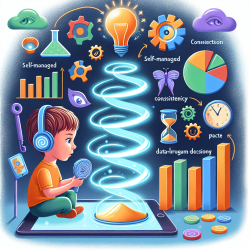Unlocking Literacy Success: Data-Driven Insights from Latin America and the Caribbean
Improving early grade literacy (EGL) is a critical objective for educational systems worldwide. A recent systematic review and meta-analysis titled What works to improve early grade literacy in Latin America and the Caribbean? A systematic review and meta-analysis provides invaluable insights into effective interventions in the Latin America and Caribbean (LAC) region. This blog distills key findings from the research to help practitioners implement successful strategies and encourage further exploration in this vital area.
Key Findings from the Review
The review examined various programs aimed at improving EGL outcomes, including teacher training, school feeding, computer-aided instruction, and technology-in-education programs. Here's a summary of the main findings:
- Teacher Training: On average, teacher training programs did not show statistically significant effects on EGL outcomes. However, in contexts where teacher training was well-implemented and complemented by sustained coaching, positive effects were observed.
- School Feeding and Nutrition Programs: These programs generally did not improve EGL outcomes, except in settings with high rates of malnutrition, such as Guatemala. This highlights the importance of context-specific interventions.
- Technology in Education: The impact of technology-in-education programs on EGL outcomes was mixed. In some cases, distributing laptops without additional pedagogical support had adverse effects on learning outcomes.
Implementing Effective Strategies
Based on the findings, practitioners can enhance their efforts to improve EGL outcomes by focusing on the following strategies:
- Combine Teacher Training with Coaching: Teacher training programs should include ongoing coaching and support to ensure the implementation of effective teaching practices. This approach has shown promise in contexts like Chile.
- Target Nutrition Programs: School feeding and nutrition programs should be tailored to regions with high rates of malnutrition. Such targeted interventions can potentially improve EGL outcomes, as evidenced by the positive results in Guatemala.
- Integrate Technology with Pedagogical Support: Technology-in-education programs should not solely focus on distributing devices. Instead, they should be integrated with strong pedagogical practices and teacher training to maximize their effectiveness.
Encouraging Further Research
The review underscores the need for more rigorous research to establish causal relationships and identify best practices. Practitioners are encouraged to participate in or initiate studies that explore the following areas:
- Long-term Impacts of Teacher Training: Investigate the long-term effects of combining teacher training with coaching on EGL outcomes.
- Context-Specific Nutrition Programs: Examine the effectiveness of targeted nutrition programs in various LAC regions to determine their impact on EGL outcomes.
- Technology Integration: Explore how different models of technology integration, combined with pedagogical support, influence EGL outcomes across diverse educational settings.
Conclusion
Improving early grade literacy in the LAC region requires a nuanced approach that considers the specific context and needs of each community. By implementing data-driven strategies and encouraging further research, practitioners can make significant strides in enhancing literacy outcomes for children.
To read the original research paper, please follow this link: What works to improve early grade literacy in Latin America and the Caribbean? A systematic review and meta-analysis.










